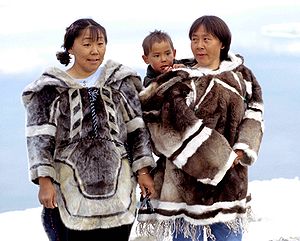Portal:Indigenous peoples of the Americas
Indigenous peoples of the Americas
|
|
The indigenous peoples of the Americas are the pre-Columbian inhabitants of North and South, and Central America, and their descendants. Pueblos indígenas (indigenous peoples) is a common term in Spanish-speaking countries. Aborigen (aboriginal/native) is used in Argentina, whereas "Amerindian" is used in Guyana but not commonly in other countries. Indigenous peoples are commonly known in Canada as Aboriginal peoples, which include First Nations, Inuit, and Métis peoples. Indigenous peoples of the United States are commonly known as Native Americans or American Indians, and Alaska Natives.
According to the prevailing New World migration model, migrations of humans from Eurasia to the Americas took place via Beringia, a land bridge which connected the two continents across what is now the Bering Strait. The majority of authorities agree that the earliest migration via Beringia took place at least 13,500 years ago, These early Paleo-Indians spread throughout the Americas, diversifying into many hundreds of culturally distinct nations and tribes. According to the oral histories of many of the indigenous peoples of the Americas, they have been living there since their genesis, described by a wide range of traditional creation accounts.
Many parts of the Americas are still populated by indigenous Americans; some countries have sizable populations, especially Belize, Bolivia, Colombia, Ecuador, Greenland, Guatemala, Mexico, and Peru. At least a thousand different indigenous languages are spoken in the Americas. Some, such as Quechua, Aymara, Guaraní, Mayan languages, and Nahuatl, count their speakers in millions. Many also maintain aspects of indigenous cultural practices to varying degrees, including religion, social organization, and subsistence practices. Like most cultures, over time, cultures specific to many Indigenous peoples have evolved to incorporate traditional aspects, but also cater to modern needs. Some indigenous peoples still live in relative isolation from Western society, and a few are still counted as uncontacted peoples. (Full article...)
Selected Article
Pontiac's War or Pontiac's Rebellion was a small war that was launched in 1763 by a loose confederation of elements of Native American tribes primarily from the Great Lakes region, the Illinois Country, and Ohio Country who were dissatisfied with British post war policies in the Great Lakes region after the British victory in the French and Indian War (1754–1763). Warriors from numerous tribes joined the uprising in an effort to drive British soldiers and settlers out of the region. The war is named after the Odawa leader Pontiac, the most prominent of many native leaders in the conflict.
Selected biography
Francisco Javier Eugenio de Santa Cruz y Espejo (Royal Audiencia of Quito, 1747–95) was a medical pioneer, writer and lawyer of mestizo origin in colonial Ecuador. Although he was a notable scientist and writer, he stands out as a polemicist who inspired the separatist movement in Quito. He is regarded as one of the most important figures in colonial Ecuador. He was Quito's first journalist and hygienist. As a journalist he spread enlightened ideas in the Royal Audiencia, and as a hygienist he composed an important treatise about sanitary conditions in colonial Ecuador that included interesting remarks about microorganisms and the spreading of disease.
Espejo was noted in his time for being a satirist. His satirical works, inspired by the philosophy of the Age of Enlightenment, were critical of the lack of education of the Audiencia of Quito, the way the economy was being handled in the Audiencia, the corruption of its authorities, and aspects of its culture in general. Because of these works he was persecuted and finally imprisoned shortly before his death.
Categories
Selected Quote
Selected picture
Did you know?
The following "Did you know" items have appeared on Wikipedia's main page. For more information about "Did you know" procedures (including how to nominate new articles for "Did you know" inclusion on Wikipedia's main page), see Wikipedia:Did you know.
- Current number groups below: Portal:Indigenous peoples of the Americas/Number (Click here to edit this number if you add more DYK groups below)
Did you know
Indigenous peoples of the Americas 1
Indigenous peoples of the Americas 2
Indigenous peoples of the Americas 3
WikiProjects
Things to do
- Join a WikiProject:
- Suggest featured articles and pictures.
- Help maintain the Indigenous peoples of the Americas portal.



